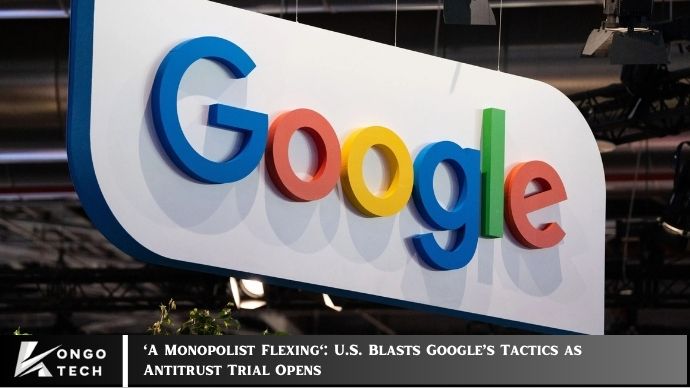The U.S. government has launched a new antitrust battle against one of the world’s largest and most powerful companies: Google. As the highly anticipated antitrust trial opens, the government is accusing Google of leveraging its dominant market position to engage in anti-competitive practices that undermine competition, harm consumers, and stifle innovation. According to the U.S. Department of Justice, Google’s tactics are nothing short of “a monopolist flexing,” flexing its muscle to dominate the digital advertising space.
In this comprehensive analysis, we’ll explore the key details of the antitrust trial against Google, the accusations being made, the potential consequences for the tech giant, and the broader implications for the tech industry as a whole. We’ll also break down what this case could mean for Google’s future, regulatory scrutiny, and the role of antitrust laws in shaping the digital economy.
1. What is the Antitrust Trial Against Google About?
At the heart of this case is Google’s dominance in the digital advertising market. The U.S. government has accused Google of engaging in anti-competitive practices that violate antitrust laws, including:
- Monopolistic control over digital ad spaces.
- Exclusive agreements with manufacturers and advertisers.
- Abuse of its dominance to suppress competition in search and advertising technology.
The trial, which began in 2023, is one of the most significant legal battles the company has faced. The case centers around Google’s control over the digital advertising ecosystem and its alleged efforts to manipulate the auction-based advertising model to maximize profits at the expense of competitors and advertisers.
2. The U.S. Government’s Accusations Against Google
In the opening statements of the trial, the U.S. government laid out a series of accusations that paint Google as a monopolist who has used its market power to create barriers for potential competitors and restrict market access for smaller players in the ad tech space.
Some key points the government highlighted include:
- Exclusive Deals with OEMs (Original Equipment Manufacturers): The government argues that Google struck deals with manufacturers of mobile devices (such as Android phones) to ensure that Google’s search engine was set as the default on their devices, thus sidelining competitors.
- Anti-Competitive Ad Tools: The Justice Department alleges that Google has built an ecosystem of advertising tools that allow it to maintain a near-total control over online ad space. This includes search advertising, video ads (through YouTube), and display advertising.
- Discriminatory Practices: Google is accused of discriminating against rivals in the ad technology space by prioritizing its own services in search results and making it harder for other companies to access valuable advertising inventory.
These tactics, according to the government, have resulted in higher ad costs for businesses and less innovation in the ad tech sector.
3. Why Google’s Market Dominance Is Under Fire
Google’s dominance in several key areas of the tech industry—especially in search, digital advertising, and video content—has raised concerns among regulators, consumer advocates, and competitors alike. Here’s why:
1. Market Share in Search and Ads
Google’s search engine controls nearly 90% of the global search market, and its dominance extends into digital advertising, where it generates billions of dollars annually from search ads alone. With such a powerful market position, the company has the ability to control how information is accessed and how businesses advertise online, which can limit competition and stifle innovation.
2. Effect on Smaller Competitors
Smaller companies often struggle to compete against Google’s vast resources. Startups and new competitors find it difficult to break into the market when Google dominates key aspects like:
- Search engine algorithms.
- Advertising auctions.
- Data collection and analysis.
The trial’s central argument is that Google has used its market dominance to prevent fair competition, which harms both consumers and smaller companies that can’t compete with its deep pockets and advertising tools.
3. Innovation Stagnation
In addition to being a competitive issue, the government argues that Google’s monopolistic control over the digital ecosystem has led to a lack of innovation. When a company has little to no competition, there is less incentive to innovate and offer new features that benefit users.
4. Key Arguments in the Antitrust Trial
In defending its actions, Google has argued that its practices are not anti-competitive but rather beneficial for consumers. Here are some of the key points Google has raised:
1. Better User Experience
Google claims that its search engine and advertising products are superior to those of its competitors, providing a better user experience and allowing businesses to reach their target audiences more effectively. Google’s legal team emphasizes that its dominance is the result of consumer choice, not coercion.
2. Benefits for Advertisers
Google has argued that its advertising tools, like Google Ads, allow businesses of all sizes to efficiently advertise to a large audience. The company asserts that its tools are designed to deliver value and relevant ads to consumers, which benefits advertisers by providing them with a high return on investment (ROI).
3. No Barriers to Entry
Google asserts that there are no barriers to entry for competitors in the digital ad market. It points to the rise of new ad platforms, such as Amazon Ads and Microsoft Advertising, which have gained market share without the need for government intervention.
5. What’s at Stake for Google and the Tech Industry?
The outcome of this trial could have profound consequences for both Google and the broader tech industry.
1. Financial Penalties
If Google is found guilty of anti-competitive behavior, the company could face substantial fines, potentially in the billions of dollars. In addition to fines, Google may be required to restructure its business practices to create a more competitive environment in the digital advertising market.
2. Structural Changes
A significant restructuring of Google’s ad tech division could be mandated. The government could require Google to divest parts of its business, break up its ad tech empire, or make its services more accessible to competitors.
3. Ripple Effect Across Big Tech
This trial could serve as a wake-up call to other big tech companies like Amazon, Apple, and Facebook, which may soon find themselves under similar scrutiny from regulators. It could change the way the industry operates, shifting the focus from market dominance to fair competition and consumer protection.
6. How Could This Affect Consumers?
While the trial is largely about anti-competitive behavior and big business, consumers also stand to be impacted by its outcome.
1. Lower Ad Costs
If Google’s monopoly in digital advertising is reduced, it could lead to lower ad costs for businesses, which could ultimately benefit consumers in the form of lower prices on goods and services.
2. More Competition, More Innovation
A more competitive ad market could also foster greater innovation, leading to the development of new ad formats and technologies that improve user experience and privacy.
3. More Diverse Search Results
If Google’s search algorithm is forced to become more neutral, consumers might see richer, more diverse search results, rather than results that favor Google’s own products and services.
7. Global Antitrust Scrutiny: How Google Is Viewed Worldwide
The U.S. is not the only country examining Google’s business practices. Global regulators—including the European Union and India—have already scrutinized Google for similar concerns:
- EU: The European Union has already fined Google billions of euros for anti-competitive practices, particularly regarding its dominance in search and its Android operating system.
- India: Google has also faced antitrust investigations in India, where regulators have accused the company of engaging in unfair business practices.
The ongoing U.S. trial could set a global precedent for how governments around the world regulate monopolistic tech giants.
May you also like it:
Micron Delivers World’s Fastest UFS 4.0 for Flagship Smartphones
Apple WWDC 2023 Keynote Live Blog (Starts at 10am PT / 17:00 UTC)
The Best Smart Speakers with Alexa, Google Assistant, and Siri
Our Favorite Alexa Speaker Just Dropped to $30 at Amazon
FAQ
1. What is Google being accused of?
Google is accused of anti-competitive practices that restrict market access, favor its own services, and manipulate digital advertising to stifle competition.
2. How does this trial affect consumers?
If Google’s tactics are deemed anti-competitive, consumers could benefit from lower ad costs, more diverse search results, and increased innovation in the digital advertising market.
3. Could Google be broken up?
While breaking up Google is unlikely, the company may be required to change its business practices, divest certain parts of its business, or make its services more accessible to competitors.
4. How long will the trial last?
The trial is expected to span several months, with a decision likely to be made in 2024.
5. Will other tech companies face similar scrutiny?
Yes, if Google is found guilty, it could trigger increased antitrust scrutiny of other big tech companies, including Apple and Amazon.
The Future of Digital Advertising and Antitrust Laws
The outcome of this trial will shape the future of digital advertising and how companies like Google are regulated. As technology continues to evolve, antitrust laws will play a critical role in ensuring that the tech industry remains competitive, innovative, and consumer-friendly.
Conclusion:
The antitrust trial against Google is a pivotal moment in the battle for a more open and competitive digital economy. As the world’s largest search engine and a dominant player in digital advertising, Google’s tactics have drawn the attention of regulators, competitors, and consumers alike. The outcome of this trial will have far-reaching implications for both Google’s business model and the broader tech landscape.
With governments worldwide increasing their scrutiny of big tech, it’s clear that antitrust action will continue to shape the future of the industry. The question remains: will Google be forced to change its ways, or will it continue to flex its muscles as a monopolist in the digital world? Only time will tell.

